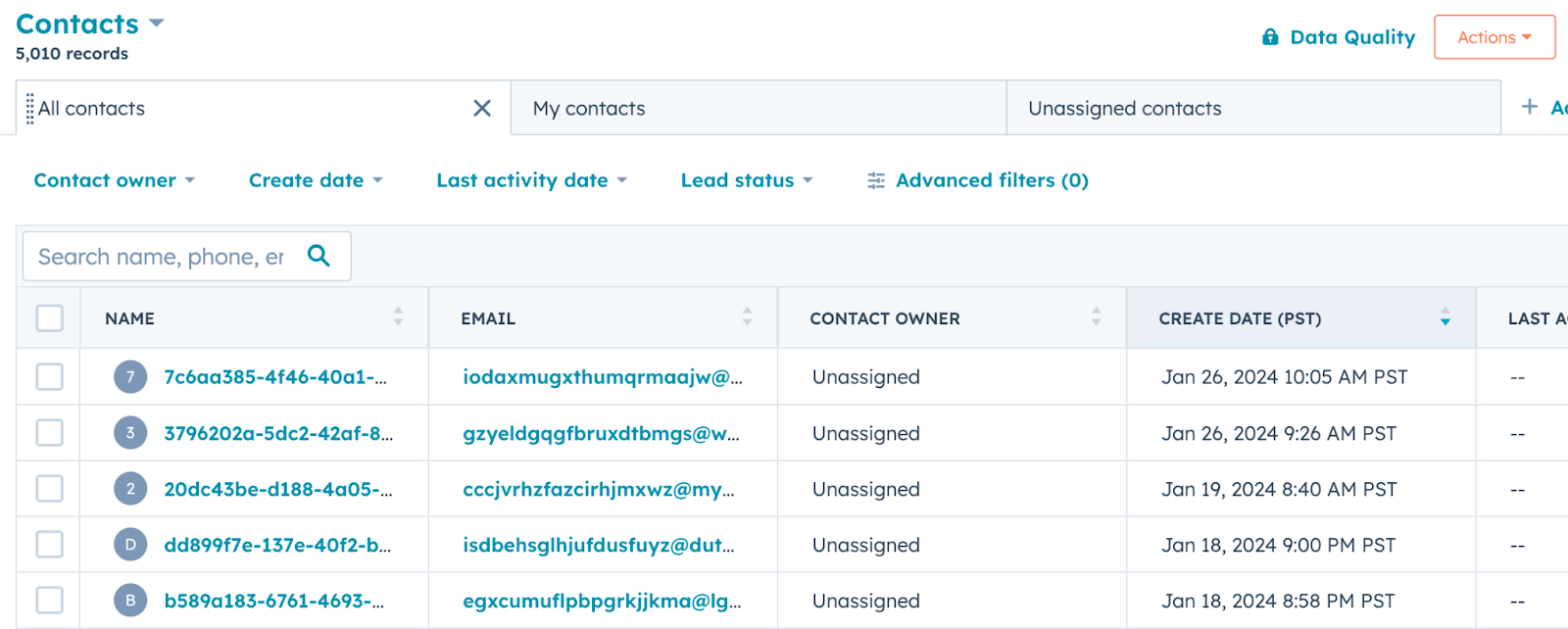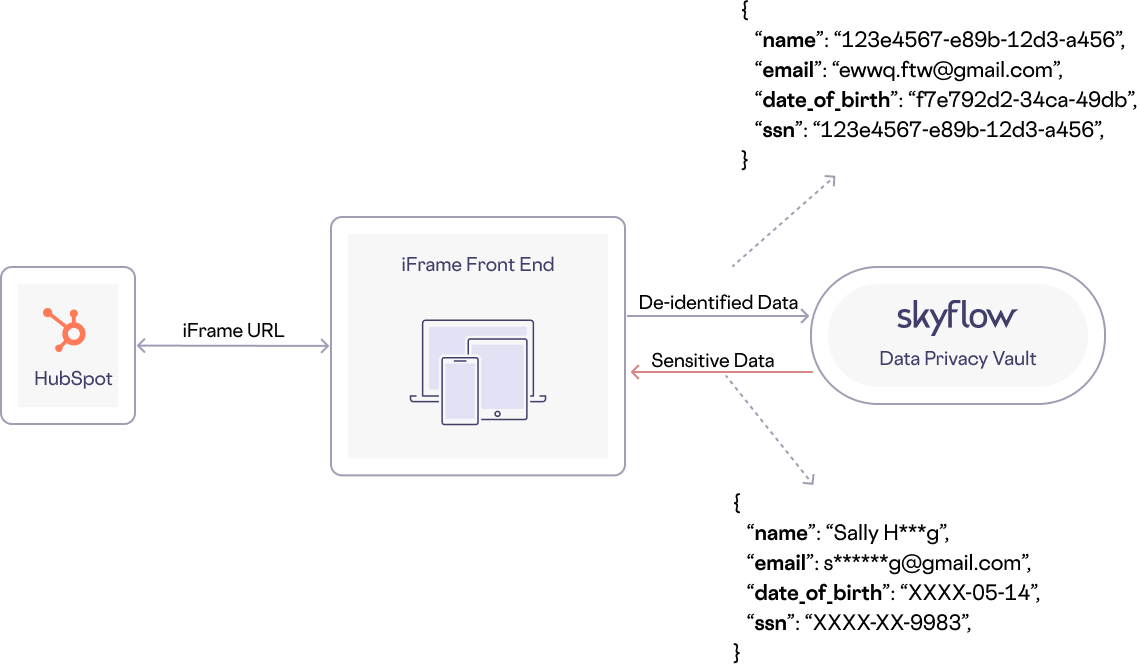February 6, 2024
Related articles
Addressing HubSpot CRM’s HIPAA Compliance Limitations with Skyflow
Discover how Skyflow can help solve the problem of collecting and managing data regulated under HIPAA in HubSpot, providing a secure solution that eases compliance.
If you’re a digital health company using HubSpot, then you’re likely facing challenges with collecting and managing sensitive customer data while complying with data protection regulations. HubSpot doesn’t natively support HIPAA compliance, making it difficult for companies in regulated industries to handle Protected Health Information (PHI) within the platform. However, by integrating Skyflow Data Privacy Vault with HubSpot, businesses can continue to use HubSpot while protecting regulated data and restricting its use as required by HIPAA and other regulations.
In this post, we’ll explore the problem of HIPAA compliance in HubSpot and the limitations of existing solutions. We’ll then dig into how Skyflow Data Privacy Vault provides a simple and secure solution, allowing businesses to collect, store, and manage regulated data that keeps their HubSpot account outside of compliance scope without sacrificing HubSpot’s functionality. We’ll also show how this approach lets Skyflow customers integrate trusted third party services with HubSpot to support their end-to-end workflows.
The Implications of HIPAA on Compliance
Any digital health company that collects their customers’ healthcare information is likely to fall under the purview of HIPAA. Understanding and complying with HIPAA is critically important due to the following considerations:
- Legal Compliance: HIPAA establishes the standard for protecting sensitive patient data in the United States. Non-compliance can lead to significant legal and financial consequences, including hefty fines and potential criminal charges.
- Data Security and Privacy: HIPAA mandates safeguards to ensure the confidentiality, integrity, and security of PHI. Digital health companies must implement these safeguards to protect patient data from breaches, unauthorized access, or misuse.
- Trust and Credibility: Compliance with HIPAA isn’t just a legal requirement but also a marker of trust and credibility. Patients and partners are more likely to engage with companies that demonstrate a commitment to protecting health information.
- Business Associate Agreements (BAAs): Digital health companies often work with third parties (business associates) who handle PHI. HIPAA requires covered entities to have BAAs in place with these associates to ensure they also comply with HIPAA requirements.
- Innovation within Legal Frameworks: Understanding HIPAA allows digital health companies to innovate while staying compliant with legal frameworks. Companies with a detailed knowledge of HIPAA are best positioned to develop new technologies and services that are compliant and secure.
- Patient Rights and Empowerment: HIPAA grants patients rights over their health information, including the right to access, amend, and obtain records of disclosures. Respecting these rights is essential for patient empowerment and engagement.
- Global Considerations: While HIPAA is a U.S. law, its principles align with global trends in data protection (like the GDPR in Europe). Compliance can position a digital health company favorably in the international market.
Overall, HIPAA compliance requires a comprehensive approach to managing and protecting health information involving administrative, technical, and physical safeguards. It necessitates ongoing evaluation and adaptation to changes in technology, legal requirements, and organizational practices.
The Challenge of HIPAA Compliance in HubSpot
Under HIPAA, businesses in the healthcare industry must adhere to strict regulations when handling PHI. However, HubSpot doesn’t offer native HIPAA compliance, posing a significant challenge for companies that need to collect and manage regulated data within the platform. Storing PHI in HubSpot can lead to potential compliance violations and security risks.
While there are alternative methods to address HIPAA compliance in HubSpot, they often fall short in terms of secure, efficient, and effective use of sensitive data. Some companies resort to manual data redaction or encryption, which can be time-consuming and error-prone. Others may choose to use separate systems for managing regulated data, leading to data silos and fragmented workflows. These approaches break existing workflows and lack the comprehensive security and streamlined integration necessary for effective HIPAA compliance.
Skyflow’s Solution for HIPAA Compliance in HubSpot
Skyflow is a data privacy vault that isolates, protects, and governs sensitive customer data like PHI. It acts as a protective layer, ensuring that only authorized systems and users have access to the actual sensitive data. Instead of storing the sensitive data directly within HubSpot, the vault transforms it securely into non-exploitable de-identified references to the original data.
Skyflow offers a solution for businesses seeking HIPAA compliance in HubSpot. By integrating Skyflow with HubSpot, companies can securely collect and manage regulated data while keeping their HubSpot account out of scope. Skyflow can also help HubSpot customers address other regulations like data residency requirements, GDPR, CCPA, DPDP, and many more.
Let’s take a closer look at how a data privacy vault eases HIPAA compliance.
Using Skyflow to Manage Regulated Data
Sensitive customer data, such as PHI, is sent directly to your Skyflow vault via a Skyflow SDK or direct API integration, bypassing HubSpot's infrastructure. The vault stores the regulated data within a HIPAA-compliant environment and returns non-exploitable de-identified data as references.
The de-identified data, in the form of tokens that reference HIPAA-regulated data elements, can be safely stored within HubSpot as part of the customers’ contact properties. This keeps HubSpot free from any regulated data, reducing the risk of compliance violations.
The image below shows how data flows from your front end application to your vault and back into HubSpot.

Below, you can see an example of what the contacts list UI looks like with de-identified values used for the NAME and EMAIL fields. You have complete control over which contact properties get de-identified and how that information is represented.
For example, an email can still look like a normal email with fields like NAME re-identified to show the customer’s name, without retaining that customer name in plaintext form in your systems. Because an email doesn’t fall under HIPAA unless it’s stored in your systems, you can deliver personalized messages without increasing your compliance scope.

Now that we have PHI data stored in a HIPAA-compliant environment and a non-sensitive representation of this PHI stored within HubSpot, we can look at retrieving and displaying regulated data within HubSpot.
Retrieving and Displaying Sensitive Data
To view sensitive data stored in your vault within HubSpot, a custom card can be used to extend the default HubSpot UI as shown in the screenshot below.

This card leverages the Skyflow JavaScript SDK to securely exchange de-identified data stored with the HubSpot contact for the original sensitive data values. Access to sensitive data can be controlled through Skyflow’s data governance engine, so that only authorized users can view specific information.
For example, you can use context-aware authorization so that only authorized users can access a given contact’s sensitive data. And, you can use partial redaction to prevent users from seeing (for example) a complete social security number if they only need to see the last four digits, as shown above.

Using this method, we can efficiently collect, search, and selectively disclose sensitive contact information in a manner that complies with HIPAA regulations, all through HubSpot. Likewise, Skyflow enables compliance with other privacy standards, such as data residency, GDPR, and PCI. Furthermore, Skyflow integrates with downstream systems, including Salesforce, and analytics platforms like Snowflake. This simplifies the management of sensitive data throughout its entire lifecycle, improving security and easing compliance.
Final Thoughts
HIPAA compliance is a critical requirement for businesses in the digital health industry, and integrating Skyflow with HubSpot provides a simple solution. By keeping your HubSpot account out of scope by using a Skyflow vault to store and manage regulated data, you can effectively manage sensitive customer data and protect it as required by HIPAA regulations.
Beyond HIPAA compliance. Skyflow lets you integrate with HubSpot, or any other CRM to offload compliance with data residency, GDPR, CCPA, PCI, and many additional requirements. This approach lets any business scale internationally and collect customer data as needed while relying on a single HubSpot account.

